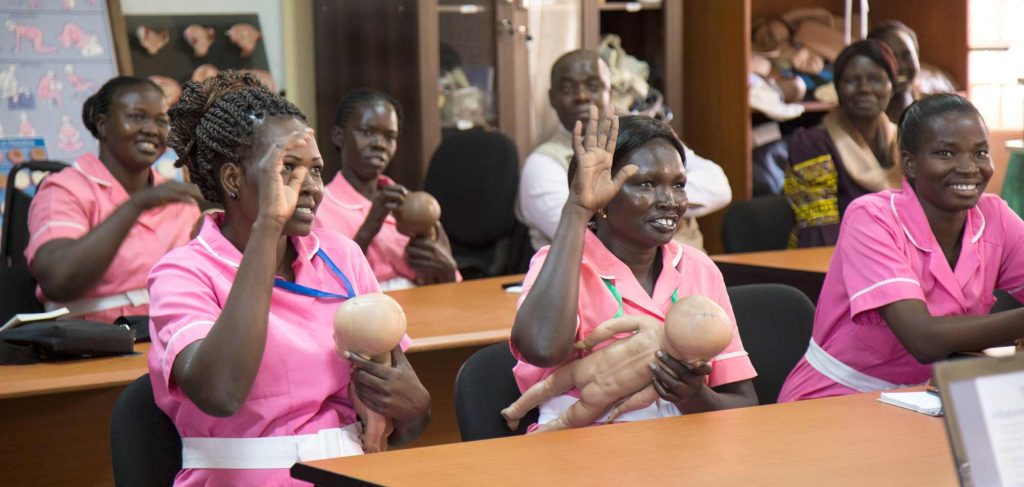
Training Activities
Building a Better Response
Strengthening capacity
An International Medical Corps-led consortium that includes Concern Worldwide and the Harvard Humanitarian Initiative. The BBR project’s goal is to enhance the knowledge and skills of national and international NGO workers while simultaneously connecting them more closely to the global system that organizes a robust humanitarian response in times of emergency. Teaching tools include e-learning in three languages as well as more traditional classroom environments.
Trauma Care Training
A video series in Ukrainian and English
We have partnered with the Harvard Humanitarian Initiative to provide training to Ukrainian healthcare providers and others in trauma care and mass casualty management, including chemical, biological, radiological, nuclear and explosive (CBRNE) hazards.
Program on Humanitarian Leadership
Helping humanitarian professionals become better leaders
Training the next generation of humanitarian leaders by combining a rigorous academic curriculum with hands-on learning including mentorship, field assignments and field placements.
Humanitarian Response Training Unit Initiative
Strengthening the humanitarian community’s ability to respond when needed
The Humanitarian Response Training Unit (HRTU) specializes in projects that strengthen the capacity of the humanitarian community, enabling it to provide a more effective and coordinated response to the needs of affected populations. The HRTU implements training projects targeting multiple audiences, including government representatives and international and national NGOs, in the many aspects of humanitarian response and coordination. The HRTU also proactively positions International Medical Corps externally within this area of training and capacity strengthening.
National NGO Capacity Strengthening Project
Training for local national non-governmental staff
Strengthening the capacity of national non-governmental organizations to respond to humanitarian crises in their countries and regions, through needs assessment, training workshops and the development of work plans for targeted interventions by appropriate subject-matter experts.
Nutrition and Food Security
Training for local national non-governmental staff
Strengthening the capacity of national non-governmental organizations to respond to humanitarian crises in their countries and regions, through needs assessment, training workshops and the development of work plans for targeted interventions by appropriate subject-matter experts.
Nutrition and Food Security
E-TRAIN
Emergency Training for Response and Improved Nutrition (E-TRAIN). Implemented in 2016 with the Center for Humanitarian Emergencies at the Emory Rollins School of Public Health in Atlanta, E-TRAIN seeks to improve the public health response, management and operations in humanitarian emergencies by focusing on the emergency nutrition response.
Mental Health and Psychosocial Support
Mental Health in Complex Emergencies
An intensive multidisciplinary six-day training course for mental health professionals and program staff who wish to establish mental health or psychosocial programs in conflict and post-conflict areas. The course covers how to conduct rapid assessments, design and set up mental health services or psychosocial programs, as well as undertake clinical work and therapeutic approaches in non-western contexts. International Medical Corps has co-organized this course for eight years jointly with Fordham University, International Medical Corps, UNCHR and HealthNet TPO.
Mental Health
Parent Skills Training
International Medical Corps participates in a WHO initiative, Parent Skills Training (PST) Pilot Program to provide evidence-based parenting skills training for caregivers of children with developmental delays and disorders. It is a global program that can be implemented locally. The main goals of the program are to promote better understanding and acceptance of developmental delay and developmental disorders and also help parents apply skills that promote child development, communication and functioning. The PST program includes a Training-of-Trainers course for first responders and professionals in Syria, Jordan and Lebanon.
Gender-Based Violence
Traditions and Opportunities Toolkit
Gender-based violence (GBV) programs have long recognized the importance of engaging community leaders as gatekeepers, service providers and agents of change. Yet GBV programs have often lacked tailored guidance and support to explore potential areas of community leader engagement and to navigate challenges related to this work, including risks of inadvertently reinforcing leadership structures that do not center women and girls. With support from the United States Office Bureau for Humanitarian Affairs, International Medical Corps developed this toolkit to provide GBV practitioners with new ideas, guidance, tools and resources to meet these challenges, and to safely and effectively engage community leaders to advance GBV prevention and response in humanitarian settings.
The Traditions and Opportunities Toolkit is designed for GBV programs, including programs implemented by local, national and international organizations, to serve as a resource in their work to address GBV in humanitarian settings—including conflict, natural disaster, displacement and different stages of emergency response. The toolkit does not outline a specific program to follow, but rather includes guidance and tools that GBV program teams can adapt and apply to engage community leaders through existing or planned GBV prevention and response programs, as appropriate to program goals, context, resources and team capacity.
Gender-Based Violence
Managing GBV in Emergencies (MGBViE) learning program
The United Nations Population Fund, International Medical Corps and Human Rights Education Associates have created a multi-phase global learning program to increase the number of gender-based violence (GBV) specialists with the technical knowledge and skills needed to respond in emergencies, including natural disaster, conflicts and population displacement, and to lead the design and implementation of GBV prevention and response interventions.
Gender-Based Violence
Global Mentorship Initiative
International Medical Corps is working with UNFPA to pilot a GBV mentorship initiative that is being rolled out during the second year of the program in 2017. Alumni of the first in-person training in 2016 have been matched with mentors who were selected through a competitive call for mentors. Alumni are able to speak with mentors about programming challenges, share concerns, ask for career advice and other guidance. International Medical Corps and UNFPA hold regular check-in calls with mentors to facilitate the exchange of best practices and lessons learned.
Support for the launch of a GBV Area of Responsibility Community of Practice
International Medical Corps continues to partner with UNFPA on the development and implementation of the GBV Area of Responsibility Community of Practice. The initiative’s goal is to strengthen professional support, provide continued learning opportunities and resources and encourage information-sharing between GBV specialists.